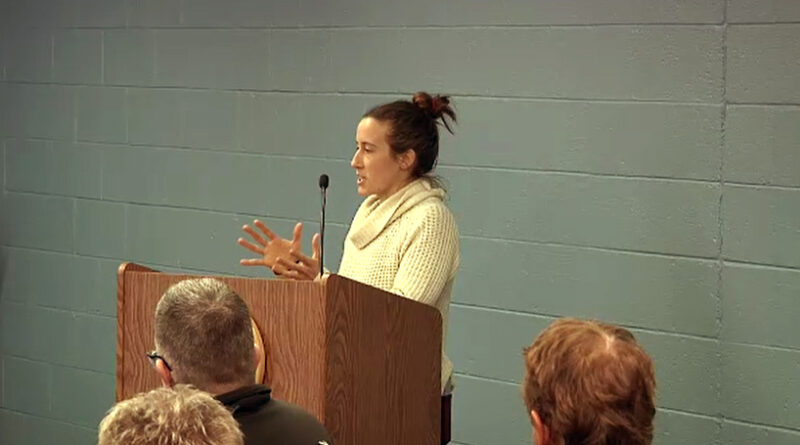City decision on term limits postponed, but many sound off
By Brandi Makuski
Although a possible vote was postponed until next month, a proposal by an outgoing member of the Stevens Point City Council to implement term limits was met with mixed reactions on Monday night.
The proposed change to the city’s bylaws would limit the number of terms for the offices of the mayor and council members. If approved, the new ordinance will apply only to terms of office beginning on or after May 15, 2023.
The proposal follows:
Mayor
No person shall be eligible to be nominated, elected, or to serve as Mayor if that person has previously held the office of Mayor for three or more full consecutive terms, unless one or more full terms has elapsed since the person last held office.
Alderperson
No person shall be eligible to be nominated, elected, or to serve as an Alderperson if that person has previously held the office of Alderperson for four or more full consecutive terms, unless one or more full terms has elapsed since the person last held office.
Other Offices
Nothing in this ordinance shall prevent someone who has completed four terms as Alderperson from being nominated, elected, or serving as Mayor, nor someone who has completed three terms as Mayor from serving as Alderperson.
The proposal comes from District 9 Councilwoman Polly Dalton. Dalton was first elected in 2019 but filed non-candidacy paperwork for the April 4 election. She explained her reasons for making the proposal before the March 13 Public Policy and General Government Committee.
“Limitations can frame our goals and intentions, and that was kind of the mindset I had when thinking about this policy proposal,” she said, adding that “a number of constituents” had also suggested the idea to her.
Dalton presented three reasons behind her proposal.
- “First, to a citizen who might be considering running for an office, I think the idea of term limits helps put a timeframe on it, so as they’re making a decision to run or not run…they know it’s two, four, eight years…they’re like, ‘Do I have the time and the wherewithal to do this for this period of time; am I interested in putting my energy towards this at this period of my life?’
- “Secondly, for those of us who are in the office, I think the idea of a term limits creates a finality to our role, and in doing so, creates some intention and purpose in doing so, knowing that the office is not about us, it’s about us being part of the community, and that the city, and it’s operations, and its governance, will continue beyond us. I think that’s just a sobering reminder for all of us in a position that is elected.
- “And then, thirdly, creating term limits, the idea in some way is, that there is more participation from people and more churning of the pot. So when people leave the office, [we have] seen that former alders continue to participate in meetings, speaking on behalf of things. So, I think, even as a citizen who maybe has served, and serves out full term limits, I think they do a lot of service, continuing for the city in that they have lived experience in the role, they have a greater understanding of city operations, and whether they show up to meetings, you know they are people who have engaged with their neighbors and their community on a very high level, and will continue to do so after their service in office.”
Councilwoman Ginger Keymer (D3), said one of her constituents asked that the decision be postponed until after the spring election. She also suggested a public hearing at next month’s committee meeting.
“I think it’s an important discussion and I would like to have it, I think there’s a lot of support for this,” she said.
District 1 Councilman Marc Christianson said he wanted the Council to get additional information before any vote on the issue.
“This is a pretty major change in structure, I don’t know how many other communities have term limits. I’d like to know what’s out there and I think it’s better to make a good decisions than a quick decisions,” he said.
Councilwoman Keely Fishler of District 10, who also chairs the committee, said she received two letters from city residents on the issue. One, from Clark St. resident Michael Richards who said he was supportive of discussing the measure, but not the timing. Any decision on a proposal like Dalton’s so close to the spring election wasn’t appropriate, Richards said.
The second letter came from former Mayor Andrew Halverson. Halverson served the city from 2007 to 2014, stepping down for an opportunity in the private sector.
In his letter, Halverson said he supports term limits at the federal level but not in local government, underlining the need for longevity in at least some positions to provide some institutional knowledge of city government.
“In fact, I find it interesting that the topic is even up for discussion, as there seems to be really no direct, focused reason, or situational reason, for doing so,” Halverson’s letter reads in part. “The electorate has the ability, each and every election cycle, for themselves to decide whether a mayor should be re-elected, or an alderperson should be re-elected. A simple democratic process. In fact, one could argue it is difficult enough to find folks to run for these offices, and this would only exacerbate the situation.”
Halverson said during his time in the mayor’s office, he found that “some of the most reflective and knowledgeable alderpersons were clearly those who were in office for numerous terms and had developed a strong understanding and historical perspective of processes, funding streams, budget cycles, staffing, etc.”
Halverson said that fresh ideas are a good thing for city government, “but understanding where we were and where we came from to know where we are going, to me, is critical.”
Keely agreed that more discussion was needed on the issue. The committee unanimously voted to postpone the matter until its next meeting on April 10.



